#that the player doesn't have the tools to handle
Explore tagged Tumblr posts
Text
here’s a hot take: a game doesn’t need to be fair to be good
#my posts#gameblogging#at this point im starting to question what 'fair' even means#considering how often it's thrown around with no other context or explanation#but to me a 'fair' game is one that sort of caters to the player#as in the game is /about/ the player and there aren't many or any situations t#that the player doesn't have the tools to handle#i'd say the majority of games are like that#thinking about it like this i wouldn't consider even games with a lot of rng to be unfair#but then you have of course games like rain world#in which the world itself doesn't care about the player#and other creatures will do their thing whether you're there or not#which means there will be unforeseen situations and inevitable deaths#and yet to me that's part of what makes it fun#and im sure there's a lot of people out there who feel the same#but i'd guess most people prefer 'fairness' and playing games that are /about/ them#which is completely fine but also explains why this game is a lot less popular than it should be#:'(
2 notes
·
View notes
Text
Master Dialogue Writing Techniques for Engaging Fiction (For Writers)
(Beware, long post!)
As fiction writers, we all know that effective dialogue is essential for bringing our stories and characters to life. After all, the way our protagonists, antagonists, and supporting players speak to one another is one of the primary ways readers get to know them on a deep, intimate level. Dialogue reveals personality, uncovers motivation, and propels the narrative forward in a way that felt narration simply can't match.
But nailing natural, compelling dialogue is easier said than done. It's a craft that takes serious skill to master, requiring writers to have a keen ear for authentic speech patterns, a nimble handle on subtext and implication, and the ability to strike that delicate balance between being true to real-world conversation while also keeping things snappy, dynamic, and laser-focused on the story at hand.
If you're someone who struggles with crafting dialogue that truly sings, never fear. In this in-depth guide, I'm going to dive deep into the techniques and best practices that will help you elevate your dialogue writing to new heights. By the end, you'll have a toolbox full of strategies to ensure that every exchange between your characters is as gripping, revealing, and unforgettable as possible.
The Fundamentals of Effective Dialogue
Before we get into the more advanced nuances of dialogue writing, let's start by covering some of the foundational principles that all great fictional conversations are built upon:
Reveal Character One of the primary functions of dialogue is to give readers a window into who your characters are as people. The way they speak — their word choices, their tone, their body language, their turns of phrase — should provide vivid insight into their personalities, backgrounds, values, quirks, and emotional states.
Think about how much you can glean about someone just from how they communicate in real life. Do they use a lot of slang and shorthand? Are they verbose and flowery with their language? Do they struggle to make eye contact or fail to respond directly to questions? All of these subtle linguistic cues are powerful tools for crafting multi-dimensional characters.
Drive the Plot Forward While revelations about character are crucial, you also want to ensure that your dialogue is constantly pushing the story itself forward. Each exchange should feel purposeful, moving the narrative along by introducing new information, triggering plot points, creating conflict, or prompting characters to make pivotal decisions.
Dialogue that feels aimless or extraneous will ultimately bore readers and detract from the forward momentum of your story. Every line should have a clear intent or function, whether it's uncovering a hidden truth, setting up a future complication, or escalating the tension in a high-stakes moment.
Establish Distinct Voices In a story featuring multiple characters, it's crucial that each person has a clearly defined and differentiated way of speaking. Readers should be able to tell who's talking just from the rhythm, diction, and personality of the dialogue, without any additional context clues.
This doesn't mean every character has to have an over-the-top, hyper-stylized way of communicating. In fact, the most effective character voices often feel grounded and natural. But there should still be distinct markers — whether it's word choice, sentence structure, tone, or speech patterns — that make each person's voice instantly recognizable.
Convey Subtext While the literal words being spoken are important, great dialogue also traffics heavily in subtext — the unspoken emotional undercurrents, power dynamics, and hidden agendas that simmer beneath the surface of a conversation.
The most compelling exchanges happen when characters are communicating on multiple levels simultaneously. Perhaps they're saying one thing out loud while their body language and tone convey a completely different sentiment. Or maybe they're engaged in a subtle war of wits, trading verbal jabs that reveal deeper wells of resentment, attraction, or vulnerability.
Mastering the art of subtext is key to creating dialogue that feels layered, lifelike, and imbued with dramatic tension.
Strategies for Writing Snappy, Realistic Dialogue
Now that we've covered the foundational principles, let's dive into some specific techniques and best practices that will take your dialogue writing to the next level:
Omit Unnecessary Details One of the biggest mistakes many writers make with dialogue is bogging it down with too much extraneous information. In real life, people rarely speak in perfectly composed, grammatically correct full sentences. We stumble over our words, interrupt each other, trail off mid-thought, and pack our speech with filler words like "um," "uh," and "you know."
While you don't want to go overboard with mimicking that messiness, you should aim to strip your dialogue of any overly formal or expository language. Stick to the essentials — the core thoughts, feelings, and information being exchanged — and let the subtext and character voices do the heavy lifting. Your readers will fill in the gaps and appreciate the authenticity.
Master the Art of Subtext As mentioned earlier, crafting dialogue that's rich in subtext is one of the keys to making it feel gripping and lifelike. Think about how much is often left unsaid in real-world conversations, with people dancing around sensitive topics, conveying hidden agendas, or engaging in subtle power struggles.
To layer that sense of unspoken tension into your own dialogue, consider techniques like:
• Having characters contradict themselves or say one thing while their body language says another
• Utilizing loaded pauses, interruptions, and moments of uncomfortable silence
• Injecting subtle sarcasm, skepticism, or implication into a character's word choices
• Allowing characters to talk past each other, missing the unspoken point of what the other person is really saying
The more you can imbue your dialogue with that layered, emotionally-charged subtext, the more it will resonate with readers on a deeper level.
Establish Distinct Voices As mentioned earlier, ensuring that each of your characters has a clearly defined and differentiated speaking voice is crucial for great dialogue. But how exactly do you go about accomplishing that?
One effective strategy is to give each person a unique set of verbal tics, idioms, or speech patterns. Maybe one character is prone to long-winded, flowery metaphors, while another speaks in clipped, efficiency-minded sentences. Perhaps your protagonist has a habit of ending statements with questioning upticks, while the sarcastic best friend always punctuates their barbs with an eye roll.
You can also play with differences in diction, syntax, and even accent/dialect to further distinguish how your characters communicate. The key is to really get to know the unique personality, background, and psychology of each person — then let those elements shine through in how they express themselves.
Lean Into Conflict and Confrontation When it comes to crafting gripping dialogue, conflict is your friend. The most compelling exchanges often arise from characters butting heads, engaging in verbal sparring matches, or working through deep-seated tensions and disagreements.
Conflict allows you to showcase the high stakes, unresolved needs, and deeper emotional currents that are driving your characters. It forces them to make bold choices, reveals aspects of their personalities that might not otherwise surface, and generates the kind of dramatic tension that will really hook your readers.
Of course, you'll want to avoid making every single dialogue scene a full-blown argument. But learning to sprinkle in well-placed moments of friction, confrontation, and clashing agendas is a surefire way to elevate the energy and impact of your character interactions.
Read Your Dialogue Out Loud One of the most valuable tricks for ensuring your dialogue sounds natural and lifelike is to read it aloud as you're writing. Hearing the words out loud will quickly expose any clunky phrasing, overly formal grammar, or inauthentic rhythms that would otherwise go unnoticed on the page.
Pay close attention to how the dialogue rolls off your tongue. Does it have a smooth, conversational flow? Or does it feel stilted and unnatural? Are your characters' unique voices shining through clearly? Are there any spots where the back-and-forth starts to drag or feel repetitive?
Actively listening to your dialogue — and making adjustments based on how it sounds in the real world — is an essential part of the writing process. It's one of the best ways to refine and polish those character interactions until they feel truly alive.
Hopefully, this can help you all!
The key is to always keep your focus on authenticity. Ask yourself: how would real people actually speak?
Hey fellow writers! I'm super excited to share that I've just launched a Tumblr community. I'm inviting all of you to join my community. All you have to do is fill out this Google form, and I'll personally send you an invitation to join the Write Right Society on Tumblr! Can't wait to see your posts!

#writing#thewriteadviceforwriters#writeblr#creative writing#writing tips#on writing#writers block#how to write#writers and poets#writers on tumblr#authoradvice#author#fiction#indie author#writer#publishing#book writing#book quote#bookblr#books#writing advice#fiction writing#writing blog#writing tools#writing resources#novel writing#writer community#fantasy novel#readers#reading
829 notes
·
View notes
Note
do you have any advice for players who are interested in ttrpgs that arent d&d but can't find dms? i can get my friends to play news systems when i run them but sometimes i want to play! but my other dm friends just want to keep running ultra homebrewed barely recognizable versions of 5e
Yeah! There are a couple of approaches I'd recommend in this case.
Since you have other DM friends, you could go with the classic quid pro quo. If there's a specific type of game they're interested in being a player in, or a specific character they're excited to play, you could offer to run a game for them in exchange for them running a game that you'd like to be a player in. Usually this should be limited to games that are relatively fixed in scope. Neither of you is going to want to commit to running an unbounded campaign, but something that's gonna be half a dozen sessions or less feels more reasonable.
With the type of DM who runs 5e-in-name-only this is definitely high risk, high reward. On the one hand, the experience of running another game might show them the joy of running a game that doesn't need to be completely rewritten to do what they want, and you could gain a DM friend who is happy to run other systems. On the other hand, they might just completely house rule and homebrew whatever new system you persuade them to run, so that it's that game in name only as well, which is a disaster. And that's assuming you can persuade them to try at all, even with the bribery of running something for them.
The second approach is what I have called the Grinch technique: if I can't find a reindeer, I'll make one instead. I am regularly converting players to GMs, it is my not particularly secret agenda when I run games.
I find the biggest thing I can do to make this happen is to just be very frank about what I find to be the tools of GMing. Players often have a very grandiose view of GMing: the GM who preps tirelessly and meticulously plots a story and knows every detail of the world. I am very clear that I don't do that. I prep scenarios with a fragile status quo, and I react to how players interact with it. When it comes to obstacles, I don't make solutions, I make problems, and then I just handle how the players approach them. Most of what I do is reacting.
I tell this to all my players, in part just to calibrate their expectations, but if players show an interest, I'll invite them further in. I'll tell them about what documents I maintain over a campaign, what my prep notes look like, little techniques I've learned to make GMing easier. And I'll tell them about games I think they'd be interested in. And when I feel like they're really starting to see how everything I do is really not that difficult, I'll start nudging them in the direction of GMing.
The last approach is to just find online spaces dedicated to this kind of thing. I prefer playing in person to online, which is why I recommend the other two first, but the third approach is definitely easiest. @anim-ttrpgs runs a great book club discord for running indie games that you can check out if you're interested in that! Dedicated discords for the game you're interested in playing almost always have a looking for group channel as well.
Hope some part of that helps.
105 notes
·
View notes
Note
I want to say I really respect you guys for not being afraid to do dark content on the game but still being mindful of players that may have been through some of the things Vesper is going through irl. (like the aftercare and safeword thing.)
Thank you so much, nonny! We like to view our game a bit like a roller coaster; it's safe because none of it is real, but it provides the illusion of danger in a way that can be really fun and thrilling if that's what you're here for.
Playing with dark content requires some amount of caution and care for everyone involved (us as creatives by handling it sensitively and ensuring it adds to the narrative and giving players tools to curate their experiences, you as players by curating your experience), and we want to give as many players as possible the opportunity to have fun with us by giving them tools. That's why the first thing you see when you open the game is an age limit and a reminder to check our warnings page (for the folks who don't mind dark content if it doesn't come as a surprise), and then the first thing you see when you start a playthrough is an introduction to the safeword system. For those who don't need them, they can click through that and then effectively ignore the system. If you don't need it, it shouldn't get in the way of your thrills, and if you do need it then it should always be accessible.
78 notes
·
View notes
Text
Masterlist
"Masterlist? What is that?"
"it's mostly a record of the writings here, feel welcome to have a look and see if something catches your eye" she turns around and points to the the book detailing where every book or pages should
"last time I updated it was june 21, so it can get a bit behind but usually everything is in here"
"a magical land where people are able to handle elements as they please, a bit too fantastical for my liking but she seems to enjoy writing them"
Tokyo debunker
There is a separate section for this subject, best visit it for the list.
Genshin impact
There is a folder on the table and named with perfect cursive handwriting "Holy offsprings". It seems it's a collection of small works
A bouquet of feelings
Sometimes actions have unexpected consequences. Good thing Aether knows how to fix this one.
Ancient language au
A long forgotten tongue slips away from their lips to the ears of people who believe it's their god's language
Read my lips
"to suddenly be left in a world where I couldn't read anything... Such a torture"
Universal language
After alhaitham found your ability you were almost forced to work for the academia translating works, some misunderstandings arise
Great sage au
A foreign face settles as a country's sage and tries to help, even when it isn't all that easy
Prologue
As a former player the new great sage had a nice base of knowledge to stand on plus some new tools
Such a backstabber
His duty with sumeru has gotten him into a trail leading to you and believes you to be a danger. For some reason the proof he has reminds you of something… wait a minute.
Over tea
Luckily after cyno recognized them as not guilty they were allowed to return to their position and enjoy their new found love for tea. Seemingly the nation's calmness has lead to people allowing themselves to fantasize about their bosses’ love life
Everything feels so beautiful
"this one fits in the timeline but I'm not sure if even the writer knows how or when..."
Secret husband timeline
Be it because of secretiveness or nobody believing it was possible nobody found out about your marriage with the iudex until someone says it straight up. Oops
The first two are two different beginnings
How the iudex sleeps
"why did she choose for him to have a resemblance with otters? Even then it's a really sweet domestic piece"
Melusines say the darndest things
sometimes children can slip up and accidentally say more than desired. In this case the journalists are very happy about that.
Drabbles
Would they peel an orange for you?
"mhmm... I wonder why she chose oranges, I think she likes better pomegranate. Wouldn't it be more fitting 'would they open a pomegranate for you?' but I guess at the end it's the same intention"
Do they know if you wear silver or gold?
"I only ever wear this uniform, I'm not really sure how important that kind of stuff is"
Types of baby daddy
"my father has been a 'baby daddy' many times, including my and my sisters' conception and many of our half siblings. Despicable man. He even runs as fast as the thunders he throws so he is hard to catch"
Your ex in my body or me in their body
"seemingly this question is used to pick a fight with your lover, I'm not sure why would you, though"
Ideas
"some blurbs or unrefined concepts, maybe in the future they can become something more polished"
Npc sagau
"suddenly strangers and your loved ones start acting as mindless zombies and only certain people seem to wake up but you are unable to know when... It sounds stressful doesn't it?"
Living together (npc sagau)
Obey me
"it would make sense for them to live close by the only people you can speak with"
"It's a kind of undefined academic environment in hell? I heard from other visitors that highschool and university are difficult and sometimes unenjoyable but isn't this a bit too on the nose? Either way seemingly she could romance demons, angels and a... Regular human? I'm sure she did not... My goodness"
Night bringer saga
All this happen during night bringer but aren't particularly connected or in a particular timeline!
Love language: acts of service
After being temporarily transformed into a demon you find that there are some gaps in your knowledge of demon features care but Solomon is very happy to help
With the firstborn's ring I made you mine
A before bed chat with Solomon leads to you showing some concerns about wearing the ring of light so openly and he offers himself as a scapegoat
Love language, gift giving
He is old enough and famous enough that he can spend some money on superfluous gift and extra candies as long as you smile at him
The sorcerer's demonic firstborn
Nobody is exempt from Mother nature's cruel whims, not even the all powerful sorcerer that defied death. Some friends of yours help you with your dream
Twisted wonderland
"another fantasy setting that happens in a world where people can use Magic and a school? I'm seeing a pattern with her likings. Just tell me she wrote for a prince or a future king or- it's just a guy with white hair again? No just because he is sleepy doesn't make him different, writer..."
Forced fairytale
The tale of the sleeping beauty is one he holds dear, be it because it's related to his great grandmother or his dorm, malleus can't help but feel like silver and the prefect would be such a perfect modern retelling.
#masterlist#genshin impact#sagau#sagau x reader#alhaitham x reader#cyno x reader#grand sage au#ancient language au#drabbles#npc sagau#npc au#obey me#obey me shall we date#solomon x reader#obey me solomon#twisted wonderland silver#silver x reader#twst silver x reader
86 notes
·
View notes
Text
This post delves heavily into Kaiser's backstory that was revealed in recent chapters of Blue Lock. The following content has graphic depictions of child abuse and neglect, so please don't click if that is something that is triggering for you.
I'll be honest and say that i was one of the few people who just originally assumed Kaiser was this rich pompous kid like Reo who's parents probably just neglected him because they were so rich, which is WHY he spends so much time trying to not only be the best but look the best.
But now that we know the truth, and that he actually had what is arguably the WORST childhood out of any of the Blue Lock boys, I think this backstory makes far more sense than what I originally thought.
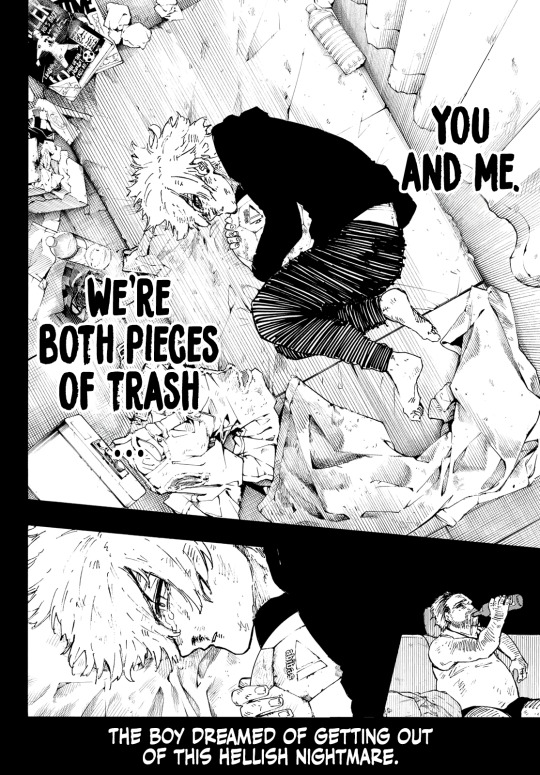
Kaiser has always been one of the most egotistical players on the field, and I don't think he's ever had moments where he genuinely doubts himself outside of when he's trying to beat Isagi. But we never knew where that ego came from and why he's so hellbent on surpassing everyone. I definitely think growing up in a poverty stricken abusive household with a parent who cares nothing for you would definitely morph your sense of identity into something more than a healthy level of egotism.
And here we can even see an explanation for how Kaiser and Ness got such an unhealthy codependent relationship from the jump. It's not Ness that's the "problem" it's Kaiser (Shocking turn of events wow) Kaiser used soccer as an emotional outlet from the abuse his father subjected him too, but it's the only thing he really has to ground him since he has always been hyper-independent from early childhood.
Kaiser's backstory is interesting because unlike the other Blue Lock boys who's main issue was that they were either too good for soccer, or that the people they played soccer with couldn't keep up, Kaiser's issue was that he ONLY had soccer.
He had no one to compete with and no one to befriend, and his only way of dealing with his home life is by playing alone.
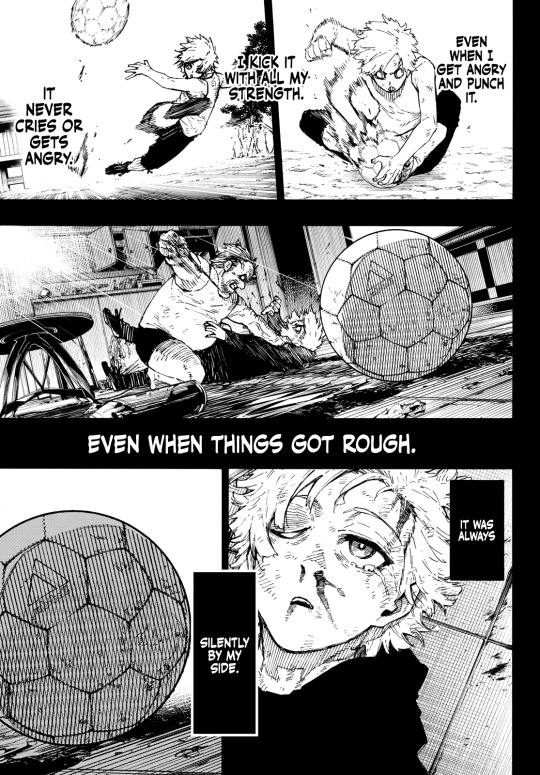
I think this really explains why he treats Ness like a grounding tool or someone to satiate his own ego and worries. He's literally not used to having friends like everyone else, and the one person he did befriend is just as socially stunted as he is. So their relationship just became toxic the more they obsessed over their own personal goals. Kaiser's goal is to become the best, and Ness' goal is to see Kaiser become the best, but when faced with road blocks in their goals they don't know how to handle it all and they immediately end up spiraling.
Kaiser also just doesn't have any healthy coping mechanisms outside of soccer because it is both his goal and his reason for living. So when someone like Isagi who's just an enigma to him stops him in his tracks from being able to succeed, he doesn't have anything after that. If soccer is his coping mechanism but it is also tied into his goals, he can't play it to 'feel better' because it'll just remind him of how he lost or how he's not as good as he should be right now.
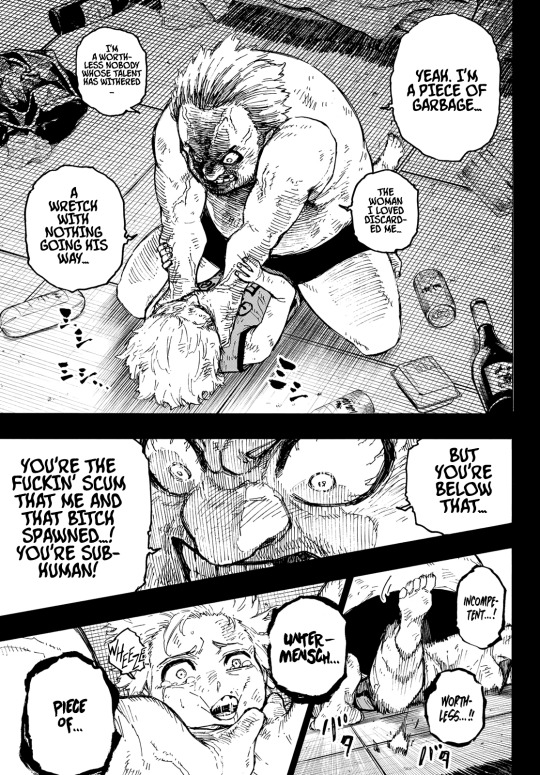
I think this panel also explains his whole "choking" thing that Ness walked in on. Now that we also know the origin of the blue rose as well, I find it to be really sad that this symbol of the impossible has been revealed to be tied so heavily with the abuse he faced as a child. It makes the scene where he's choking himself seem less like him trying to "focus" more like he went to also punish himself for being "inadequate".
Even in the panels above where his dad is literally choking him for no reason, his father is telling him how he is worthless and useless etc. It definitely puts into perspective his mindset when he was harming himself.
All this to say that Kaiser has internalized his trauma to a dangerous degree if the current state of his mind is anything to go off of.
59 notes
·
View notes
Text
Just finished Mouthwashing, after hearing all sorts of snippets of fandom drama about it. I'd stayed away from all that because I didn't have the context, but now I do! So I'm blasting you all with my thoughts.
Long post. Be prepared. Spoilers for Mouthwashing and CW for in-depth discussion of SA below.
So the biggest aspect of the drama side of the fandom that I've been seeing is how the game handled Anya's rape. Some people think it was devastating and properly showed the awfulness of Jimmy, and feel Anya's trauma was portrayed accurately and handled well. Others think Anya was somewhat one-dimensional; she was given a stereotypically female-specific trauma to match the different pain/traumas of the other crew members, and feel the subject wasn't given enough weight and respect.
After having played the game (while also going into it with the knowledge and expectation that it would be about SA), I can see both sides. Though I think my thoughts on everything come from some core details.
Firstly, the core theme of the game is not SA. It's karma. Jimmy is a terrible person who doesn't care about the pain he inflicts on others, as long as he gains something from it. The game follows him as he destroys the people around him, and treats them like fodder to fuel his own goals. We see all of this catch up to him in the end, and he's sortof divinely punished, or overcome with guilt, or whatever it is, because of it. Each person's harm is unique and everybody has their own micro-themes, but the core theme of the game is overwhelmingly karma.
Essentially, this is not a game about SA. This is a game about a terrible person getting what's coming to him.
Secondly, rape as shock content is a common gripe regarding mostly horror movies. It's a quick and easy way to create motivation, so much so that it's turned into its own subgenre of 'rape and revenge' plots. Think I Spit On Your Grave style movies. The other side of the same coin is objectifying the victim, which creates an exploitative feel. The act of the rape itself, and furthermore the shock of it, is more important than the victim and their feelings and trauma. Rape is detached from the lasting harm it causes, and is more something to justify getting up in arms about something/someone rather than a trauma.
And while we do see some of Anya's trauma from SA, Mouthwashing by and large is not meant to be a commentary on SA specifically. Again, it's about how terrible of a person Jimmy is, which makes the SA, at least in part, a tool to make the player hate him.
Ultimately, if Mouthwashing was changed to where Anya faced a different form of harm from Jimmy, instead of SA, it would still be just about the same game. You could still make a convincing game with karma and bad people getting their comeuppance as the core theme. And that I think is the most important realization to have about the subject.
Anya's SA was the first trauma, and the details of the aftermath are what kickstarted the plot, but it was, intentionally or not, a tool to make you hate Jimmy. Because the game isn't about Anya and her trauma. It's about Jimmy and his karma.
I think Mouthwashing is fascinating, and that theme of karma is not something I see done well very often. I think the style of the plot and all the little details that expound upon the micro-themes of the game are extremely well done. And I think it did handle its themes of SA better than a lot of content that discusses it. But it's not perfect, and it falls short of really digging into the true weight of it. It's not a game that makes any real progress on the portrayal of sexual trauma in media. It's cleaner and less graphic than 'rape and revenge' stories, but it ultimately still relies on exploiting the shock of rape to serve a 'bigger' plot.
It's late, I'm tired, and I'm struggling to properly word what I'm feeling, but hopefully my interpretation of nuance comes through.
#restating again that i really liked mouthwashing and i think it's super creative#it just is not a game about sa#trying to look at it through that lens and deem it exemplary as a game about sa is misguided#anyway#tw sa#mouthwashing#anya mouthwashing#jimmy mouthwashing#long post#i rate this game 7/10 btw#i might make a post in the future discussing my thoughts on the woobification of media by fandoms#because that is also a huge critique by people critical of mouthwashing#but that time is not now#i have no idea how this post will be recieved. but i can only hope i don't get crucified for it
28 notes
·
View notes
Text
I'll never get over how Athena's trauma is written in Dual Destinies. I never will. It's one of few areas I have absolutely no complaints about.
At a surface-level, it's a very effective tool to evoke discomfort, fear, pity, and intrugue from the player. We get glimpses as to what's causing these nervous breakdowns of hers in 5-1 and it's nothing comforting (a courtroom with bloodied-out faces staring judgementally at a crying child is... distrubing). Those breakdowns are accompanied by near silence, letting us drink in the raw emotions of the moment. Her breakdown in 5-3 is a standout example; there's nothing but hollow wind and a shivering, broken Athena to lend the moment its deserved gravitas as she fruitlessly tries to calm herself.


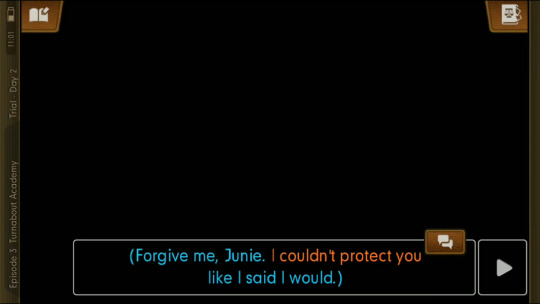
Repeating the trauma of having to defend a dear friend from being accused for killing their tutor, in spite of nobody listening to you, is going to do that to you.
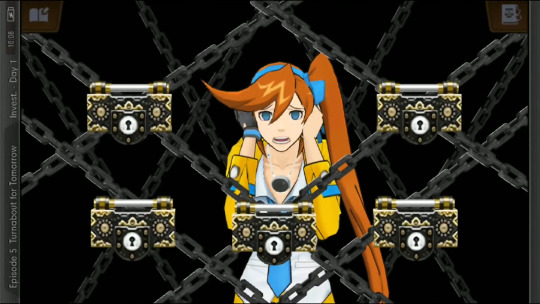

Come the revelations in 5-5, we get compelling body language with her covering her ears in distress - the most sensitive part of her & source of a lot of pain in her childhood. Shaking her head in denial at the revelation of what Simon saw when he walked in the robotics lab, how rarely she comes out of her sad pose during the first half of 5-5 (reminiscent of Edgeworth's own brooding pose in the Wright Trilogy, most often seen when he's reliving his own traumas). Even after things come to light and the truth is revealed, she struggles to even say what happened while locked in that Edgeworth arm-grab pose. It's fantastically handled each time it rears its ugly head.

Going deeper, it also explains a lot about her behaviour; her reflexive throwing of the police officer in 5-2 and her furious outbursts being some good examples. Her emotional state is pretty wild throughout Dual Destinies - partially because she's just like that - but partially because she's trying to keep the more uncomfortable feelings down. She goes quiet when the Blackquills first arrive, being avoidant around the topic of Simon and unable to confront Aura for just how cynical and loathing she's become. She's very iffy around blood and is noticably uncomfortable and perturbed during 5-3 (for reasons I have already mentioned). Her main motivation for keeping this pain to herself is a tragically relatable one; not wanting the drag others down in her sorrow. That's the reason she gives Phoenix when he tells him to back down and stop fighting (a stark contrast to when she objected on his behalf in 5-DLC, sensing he still had some fire left in him).


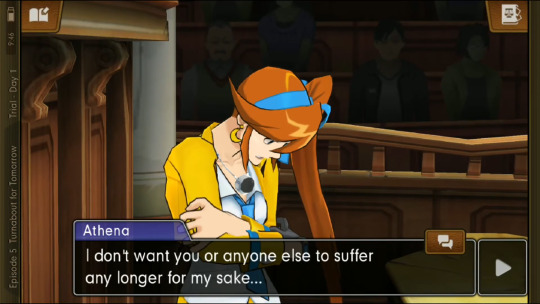
Despite having others help bring her back from a dark state of mind before, her pushing others away to carry the sufferage alone when it's too much for her feels painfully real.
But one of my favourite parts is how other characters handle it. Specifically, how Phoenix handles himself around Athena. Even if he doesn't know the full extent of her traumas, he knows she's nervous and perhaps not in the best of spirits. He's a LOT more gentle with her than Apollo, is for damn sure; guiding her through examining Courte's body and praising her for getting through it despite going pale. He does still tease in 5-DLC, 5-3, and 5-4, but it's more playful than what he does with Apollo. He also keeps it to a minimum in 5-1 after just barely making it before she has another shutdown, prioritising his role as a reliable presence over anything else. A very good example of this is 5-5; when the big revelation finally comes and Athena's ready to confess to what really happened during UR-1, Phoenix is there to reassure her that she's safe and prevents the Judge from butting in to give her room to disclose what happened.
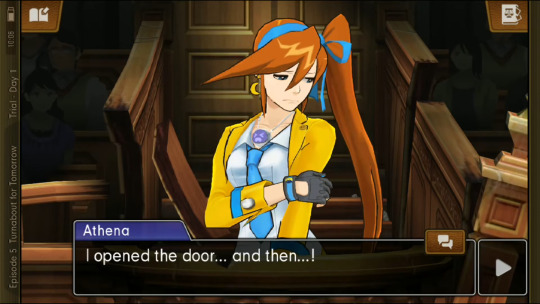
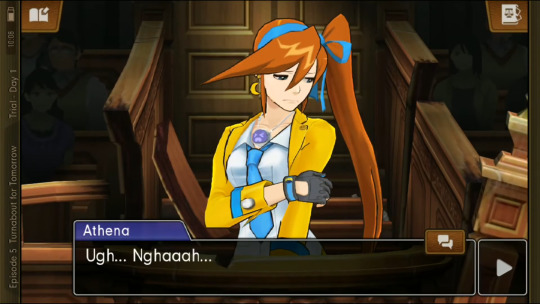
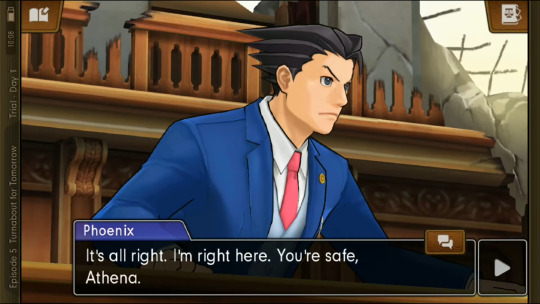

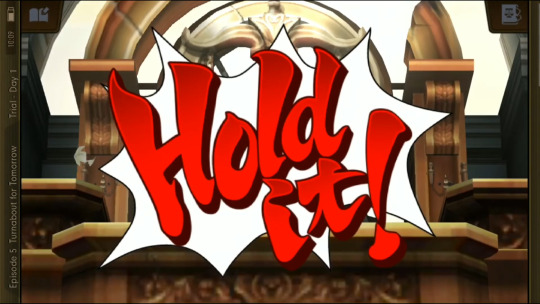
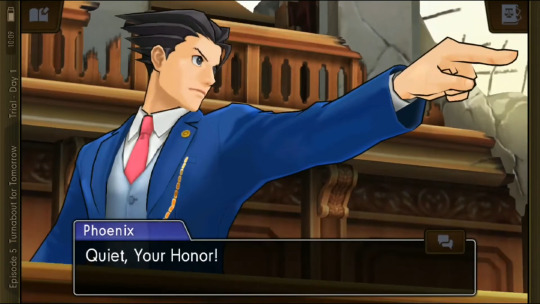
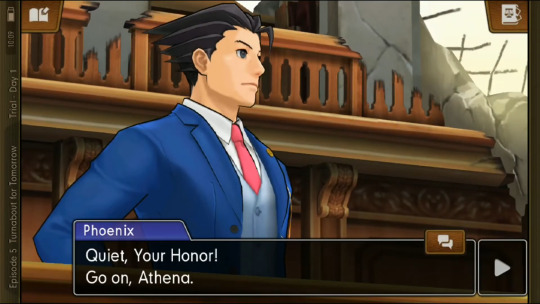
When push comes to shove and Athena can't quite make it out of that terrible mental space on her own, it's her friends and allies that ultimately help pull her out. Juniper Woods re-assures Athena of her faith, something that had appeared to waver over this case until the truth of what she saw the day of the murder came out. Simon Blackquill reminds her why she's even here to begin with, indirectly stating that he so desperately wishes her to succeed and bring them both out of this mess. Apollo Justice - on top of the usual "your're fine!" bit - reminds her of the skills she has to turn 5-3 around. Phoenix Wright, having dealt with many a client and friend burdened by trauma, gives Athena the stable footing she needs to get back up and carry on. Even if he needs to step in now and then, it's not to belittle or infantalise her - it's to be supportive.
I've said before in a past essay I don't really think too highly of anymore that I don't really mind the fact that Athena needs so much help throughout the game. This is the main reason why; her PTSD from the events of UR-1 have a believable impact on her character and ability to perform normally, with characters helping to pull her back out in ways unique to them and their respective relationship to her. As I said, she gets all that support because she genuinely NEEDS it. The game does a good job proving that much.
And that's alright.
Part of the reason it took so long to solve this is that Athena constantly pushed people away from her problems. She didn't want anyone else to become another psychological casualty of something that otherwise only affects her. It's when she finally sees that Phoenix can and does help her that she can finally let him do so, and help him in return by digging into that dark place and letting the memories of that day come back to her.

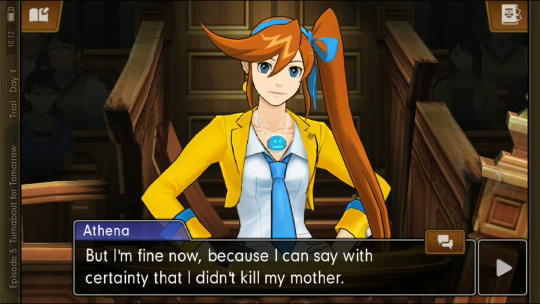
Trauma in Ace Attorney doesn't often get this level of focus. It can and has been depicted rather well in the past - see Edgeworth for a good example - but Athena, being the heart-on-your-sleeve type and a protagonist, offers a unique opportunity to witness how it affects her on a more personal, sometimes first-person level. Between a gut-wrenching and haunting presentation, stellar characterisation, and fairly grounded consequences and reactions to it from her and others... it's a rare part of Dual Destinies that I have no complaints about.
Happy Thena Thursday!.....?
#dual destinies analysis#thena thursday#thena thoughts#dual destinies spoilers#ace attorney spoilers#athena cykes#dual destinies#undescribed#i'd also like to mention how painful it is to see shivering athena from the counsel perspective.#you're standing right next to her while she's in genuine anguish and telling you to stand down and accept her guilt.#the same things that make us laugh make us cry just as hard.
199 notes
·
View notes
Note
"It varies mechanic to mechanic, but they don’t score any lower as a group against other mechanics. Some, like Monarch, are quite popular."
People are criticizing the helper card mechanics because they are very complex, require specific varied tracking and they are virtually impossible to play with unless you constantly refer to helper card (compared to most cards that you can understand by simply reading its oracle text or reminder text).
The Monarch doesn't have any of those issues. It's an elegant and masterfully designed mechanic. The Monarch is very simple and straightforward, so much so that the oracle text from The Monarch token could fit as reminder text on several monarch cards. That can't be said about Day/Night, The Initiative, Venture in the Dungeon, Rad counters or Tempted by the Ring. I've probably looked at the double sided Tempted by the Ring helper token over 100 times and I can't confidently tell someone exactly how the mechanic works if I don't have the helper token to read from. It's an extremely complex and multifaceted mechanic. I would say more complicated and wordy than 98% of other Magic mechanics.
Can you please make more "outside of the game" helper card style mechanics that are easy to comprehend and intuitive?
The Monarch and Ascend are examples of mechanics like this. More of that please! The more complex mechanics that create outside of the game elements are intimidating (i.e. Venture into the Dungeon, Tempted by the Ring, The Initiative, Day/Night) and in my experience, they slow down the game because players can't understand them easily.
Lastly, I'm offering this feedback as a major Magic enthusiast and long time veteran player who also plays with experienced players regularly. I can't even begin to imagine how daunting these types of mechanics must feel for novice players!
I talk a lot about how different players enjoy different aspects of the game. What I talk far less about is different players struggle with different aspects. Some can’t handle excessive processing; some have issues with sequencing; some don’t understand the nuances of the rules; some aren’t good with memory.
My best guess with you is you internalize (aka work from memory) card abilities most of the time, so cards which exceed your ability to memorize cause you issues.
Because players see the game through the lens of their own experience, the feedback they tend to give is “stop doing thing X” because thing X is the element that they personally struggle with.
The challenge is there are players that don’t struggle with that element of the game and thus enjoy thing X. For example, my biggest note on this blog about dungeons isn’t they’re too hard to process, but there aren’t enough of them.
So, it’s a balance. We need to understand the ways in which people struggle and help accordingly where we can. I agree that we need to be cautious how complex and wordy we are on elements off the card. And we have to be careful how often we use that tool.
Now there is a threshold where enough players struggle, that we have to question if a particular aspect is worth it. I don’t think we’re there yet with external game pieces, but I do loudly hear the note that we have to be better with as-fan of the helper cards showing up. The note that we need to auto-include more helper cards in the prerelease kits is also a strong one.
So yes, I’m aware that outside game pieces come at a real cost for a certain type of player, and it is something we have to keep in mind when designing them. I personally think we could have simplified Tempted by the Ring a bit, for example, but I do think it was right to include in the product.
Thanks for your feedback.
81 notes
·
View notes
Text
simplicity in design is a virtue, you cretins
i'm rereading Avery Alder & Ben Rosenbaum's Dream Askew / Dream Apart in preparation to finally do some serious editing of my game of intimacy, liberation, and faggots at sea Beneath Pirate Flags. among the billion other small things i'm reconsidering as i go over the bob/ndnm fundamentals, i'm really struck by how simple both these games are — elegant in a way i think i really failed to capture in the first public versions of bpf.
i have a theory about this, and it has to do with why i think the sprawling "always another sourcebook" approach taken by a lot of dungeons & drasprawling, commercially successful ttrpgs is fundamentally weak design — but first, here's one of them fancy 'keep reading' buttons you can click on to keep this post from being six and a half miles long.
hey, welcome back. lets get into the details:
bpf makes a critical break from the original ndnm games in the way its environmental playbooks work. mine are things like "the fort" and "the map" (see images) — individual iterations of broader concepts, much like the character playbooks ("legend", "dandy", "monkey" etc) are iterations of common pirate types. there are, almost certainly, multiple "monkeys" in one world — much as there are almost certainly multiple forts.


this contrasts with Askew / Apart's setting books — things like "varied scarcities," "society intact," and "goyishe world." these are intentionally broad environmental pressures. although "society intact" may be encountered different times in different places — with different names and different faces — it is, fundamentally, the same force.
2. this isn't necessarily a thing i want to change (although there are tweaks i'll be making to just about all the playbooks) but it is real interesting to think about how bpf got here, from a design perspective. the story is simple: bpf didn't start from playing either dream. it started with me reading wanderhome, and this design is borrowed (nearly) directly from there.
wanderhome, like bpf, has players create new environmental elements again and again over the course of a campaign — from the smallest kith to the largest citadel, you might be doing generation multiple times in a single session. wanderhome handles this by simplifying, simplifying, simplifying — a trait has one picklist, a nature two, and so the process of generation is quick and nondisruptive, and you're quickly able to create a populated world without losing yourself in any particular moment of generation.
(che, i hear you shouting, you baited us in with an inflammatory claim about d&d's bad design. get to the point already. ok. i will)
one of the things i like most about possum creek games as a whole (ha, got you again) is the way they can become sprawling without ever overwhelming players. this has been talked about a lot in advance of the yazeba's release — but it's true for wanderhome, too.
where both dream askew and dream apart have just six setting elements, wanderhome has (even if you disregard the seasons and holidays) a whopping forty-eight traits and thirty-six natures. it is — despite seeming small in the shadow of yazeba's — a sprawling game, and it's only through a tremendous efficiency and elegance in design that the whole thing doesn't come bursting apart at the seams. some of that is thanks to the ndnm token economy as a whole and some of it is good writing specific to wanderhome, but none of it is possible without an ethic that prioritizes simplicity — cutting the building blocks into their smallest fundamentals, so they can fit into something huge and, more importantly, comprehensible.
this all stands in sharp contrast to what seems to be the tendency in dice- and percentage- based games (told you i'd get there eventually), who — out of a need for a bespoke, simulationist tool for every situation, maybe — have a tendency towards appendices, supplemental books, and a proliferation of minutiae. i am talking about d&d here, although i don't think it's the worst offender — i still have nightmares about the hand-to-hand system from top secret, a game my dad only recently admitted he was "basically only pretending to understand the rules of" when he ran it for my friends and i when we were kids. i'm not saying all crunchy game design is like this — honestly, i think crunchiness is a totally different spectrum from rules-complexity — but i do think that, sometimes, in an effort to feel sprawling and more importantly substantial, games become inefficient and more or less illegible. it is hard to play d&d. it is hard to hold all those rules in your head. by comparison, dream askew, dream apart, and wanderhome can held pretty easily in your head. you could probably even reconstruct some of the playbooks from the design fundamentals (act weak = gain token, act strong = spend token, evocative picklist). the most important thing about these games is that the rules are evocative and they let you stay in the fun part of play for as long as possible, interrupted as little as possible.
let me make this totally clear: the fun part of a game can absolutely be tallying numbers and consulting armor ratings, but i don't think that's the reason some of these games get so big. the real answer is: cutting shit is hard! eliminating systems is hard! saying "this is not helpful, let it go" is really tough, especially when you're left with a design document that was shorter (and by extension, whispers the awful voice in the back of your head, worth less) than you were expecting. still, it's important to remember: 'good system design' is not the same thing as 'filling as many pages as possible.', even if that's hard to accept in an industry that feels like it has to be prices and paid by the page.
how does all this affect beneath pirate flags? well, that's simple — pretty quickly in my recent playtesting, i realized that pausing mid-session to create new maps, forts, ships, and so on sucks ass. it's fun to brainstorm with friends, but the environmental generation throws off the pacing of sessions in a way the wanderhome kith stuff just doesn't. why? there's too much shit in my environmental playbooks! wanderhome has two picklists per nature and one per trait. askew & apart have just one per setting element — and you only have to do it once per campaign. beneath pirate flags has five. five! it sucks! and cutting out that unecessary shit — even if i do want to straddle the middleground between dream askew & dream apart's simplicity and wanderhome's sprawling growth — is going to be the hard first step on the long road to getting this game where it ought to be.
#ttrpg#ttrpg design#wanderhome#dream askew#dream apart#beneath pirate flags#gay pirates#rant aside i am really eager to get back to working on this game#it has such good bones but its gonna be a long road to being done with it#no dice no masters#belonging outside belonging
164 notes
·
View notes
Note
I've been seeing complaints that Spenser was 'trying too hard to kill the cast' this episode, which I have to say I wildly disagree with, but I will admit to be a little confused why the players sometimes took one or even two marks after rolling a six. Or I guess I'm not confused so much as I wonder if the mechanics for injury, success, failure, etc could be too vague atm? Candela doesn't really have anything like CR rating or DC which it doesn't NEED, but I guess could create some grey area?
Good question! Here's the secret: all TTRPGs I'd consider worth my time have a huge swathe of gray area, D&D very much included (indeed, I find a lot of the more baseless criticisms of D&D, especially from Game Based Heavily On D&D But Different fans (derogatory) to come from people mad at that gray area) and as long as the players and GM have agreed on it, it's fine. With that said I admit that paying attention to individual rolls is not what I am inclined, personally, to do, but if this is about Sean rolling a six and taking two body...that is because he was going to take four body off the bat and reduced it with a good roll that the GM permitted him. (It also might be about Marion taking in the rift, which was similarly stated beforehand to cost him a Bleed scar no matter what he rolled, the roll reflecting how successful he was.) Now, we can talk about the implications of taking four body seemingly out of nowhere, but do recall that is coming off an earlier 1 roll in his interaction with Duncan.
CR ratings generally are a poor understanding of difficulty, and the thing about DCs is you can set them arbitrarily high (or for that matter, secretly low). Like...to use D&D, you cannot make a persuasion check for someone who dislikes you to give you all their belongings and run away forever. The DM is going to set the persuasion check at 50 and it is going to be unreachable by any means. Even a nat 20 will give you a result of "they think you're joking and laugh it off instead of run after you with a sword." If you jump off a sufficiently high cliff in D&D and roll a nat 20 to land, you still might take enough damage to die during your three-point landing. And so on.
So: while we don't have all the rules of Candela Obscura, it is valid from my knowledge of the Forged in the Dark engine, which Illuminated Worlds was heavily influenced by, for Spenser to say "this action is unbelievably dangerous and there is no possible way you are escaping unscathed, and a full success means that you live to tell the tale with only a gunshot wound or bleed damage rather than outright death." That's the other thing: completely valid for the GM to come in planning to kill the players. That's the premise of EXU Calamity. I would assume the table discussed that this was going to be a much darker and more dangerous game than Chapter 1 and everyone shares those expectations, and is prepared to possibly lose these characters. Which is, frankly, another thing that comes up specifically in actual play: what the table knows and expects and is prepared to accept is often something much harsher than the audience is prepared to accept. I mentioned being irritated at the presumptive nature of a lot of safety tool discussion (and am feeling very validated by Spenser's tweet about how he handled the letters to Sean) but like...when the CR or D20 or Candela tables prepare for their games, they have talked about expectations of tone and whether the GM will be trying to gently usher new players to victory, flat out gunning for a potential TPK, or somewhere in between.
This was a long, pre-full dose of caffeine way to say that one of the biggest rules of GM-ing is that the GM sets the tone of which the danger and difficulty of the world is part, and also that, based on everything about how this chapter has been presented, if someone accuses Spenser of being very hard on the party my answer is "...yeah, no shit, did you fail to realize that from the tone and text of literally every trailer and interview?"
#answered#Anonymous#candela obscura#i don't necessarily think the people making this complaint are No Combat D&D People. but also. they give off that air.#that But TTRPGs Are Supposed To Be About How Cool My PC Is and it's like. you can do that at your table#some of us want to experience catharsis through fiction though hope this helps
93 notes
·
View notes
Text
Sayjin Minecraft HCs
-Sayeon would have the skin set to default for the first few weeks until Ryujin changed it for her.
-Ryujin would periodically change Sayeon's skin into ridiculous things.
-Ryujin made her own skin and its her usual look translated into pixels.
-Ryujin insists they both play in survival, Sayeon took some time adjusting to the different play style.
-Despite being a creative mode player Sayeon adjusted pretty well, she can handle herself and fight mobs.
-Survival mode didn't stop her from creating massive builds, she finds the process much more rewarding in survival mode.
-Ryujin would being home saplings for Sayeon and give her the spare cobblestone whenever she stripmines.
-Ryujin would usually just crash at Sayeon's minecraft house.
-Sayeon begrudgingly builds a room in her house for Ryujin, Ryujin uses that space as a storage area instead and still stays at Sayeon's room.
-Ryujin likes mining and exploring the world, usually brings home lots of loot.
-Sayeon likes the farming and building aspect of the game more, she usually just stays at the base expanding her builds.
-Sometimes Ryujin would shoot an arrow at Sayeon whenever she was building until she falls, Sayeon would either ignore her and block off her arrows or go down and chase her until Ryujin gets skilled.
- Sayeon gives Ryujin tours of her finished builds and rambles on about architecture lore about the references she used; Ryujin pretends to hate these tours but would always come whenever Sayeon wants to conduct one.
- Ryujin would build little music machines underneath Sayeon's builds, she would usually hide the pressure plates that trigger them to start.
-Sayeon finds it a pleasant surprise whenever she discovers one.
-Ryujin refuses to fill up creeper holes, it drives Sayeon insane whenever she sees one.
-Ryujin has a villager farm/trading hall that was just a shitty cobblestone box, Sayeon remodeled it to make it more pleasing to the eyes.
-Ryujin didn't mind, she just gave suggestions to make it look more evil.
-Ryujin would sometimes invite Sayeon to expeditions, shenanigans ensue.
-Ryujin would give Sayeon spare armor, sometimes she'd make a set just for her. She'd also give her tools.
- Ryujin and Sayeon would build together sometimes, Ryujin is fully capable in making good builds but opts to provide resources for Sayeon instead.
- Ryujin brought Sayeon along to defeat the ender dragon.
-While Ryujin was taking down the end crystals Sayeon manages to kill the dragon with beds, she doesn't elaborate how and when she learned how to this.
-Sometimes the two of them would have mining competitions, whoever brought home the best loot wins.
-Sayeon made a point system just for these competitions.
52 notes
·
View notes
Note
Man yuji could have eaten sukuna and have sukuna learning love that way but gege hates yuji so much he rather leave a continuation open with sukuna but it would be without yuji
It's so sad he hates Yuji so much, ruining sukuna too since sukuita was so good
Anon, I understand you since I would always prefer them coexisting together but logically that was not possible since tengen was in sukuna remains and if yuji eats that it would be him inside of that tomb of star stuck forever maintaining the barriers which I personally would have hated that a lot.
Now in my opinion I don't think gege hates yuji or any character in general.. He just thinks of them as a tool to tell the story he wants to. And getting attached to them would probably affect his writing.. But that doesn't mean his handling of yuji as the mc is great as a character tho he has done yuji justice but as an mc absolutely not.
Maybe because jjk in general was more plot driven although he somewhat gave up on that plot too in the end ... I will discuss that in another post..
I don't know how you got this idea that he can continue sukuna without yuji ..maybe before but not now. You know why??.. Because if you notice gege hasn't resolved plotlines at all. Especially related to yuji.. Like yuji's lineage, his soul being intertwined with sukuna. We still don't know if his connection has severed or not. (And before you doubt remember rika still had connection with yuta even after she passed on in vol 0. then even after changing body that connection still did not break.) Then we have jin itadori and kaori.. We all saw kenny had expectations for him but we never got any clear ans for that.
In 257 sukuna said kenny wouldn't have a child for no reason. I know some people say it was to contain sukuna but then why sukuna didn't acknowledge that although in the next page he does say the finger was sealed in yuji to ensure his strength as vessel and to make him a cg player.. But it is clear kenny had other reasons too which even sukuna couldn't comprehend.. Then we have cursed realm and yuji sukuna trip which isn't clear if it was his domain or what, his domain name too. Not to forget he gave us another plotline too that is that girl who is dressed like shrine maiden.
What I am trying to say is that gege can't make a sequel without solving these plot points which he deliberately chose not to resolve and he needs BOTH yuji and sukuna for that and kenjaku too.. The only question is whether he does it through a sequel, prequel,anime, q&a or simply decides to ignore..
12 notes
·
View notes
Note
can I get some timewarp Charles or Dutch? I love your au 😭
cracks every bone in my hands lets fucking gooo
charles blessed and beloved. he died of illness in 1908 but it was so peaceful he died in his sleep in a warm bed and as got sick he accepted it with a very similar flare to hosea talking about bessie where he was quietly hopeful he would get to see arthur again and instead of being jolted to the present like the more violent deaths he just woke up peacefully to an arthur that got to age and looks healthy and is smiling at him so affectionately because he missed him so much
they're in love, your honor
arthur already has his own place (very close to hosea's, of course) so charles immediately moves in with arthur and they fall into domestic bliss without actually having the conversation of 'i know we were close friends and confidants with unaddressed feelings in the past and it's been almost a decade and you had to mourn me but do you want to be my partner for the rest of our natural lives btw i have an adult son'
charles is still awkward though he didn't understand life and people in 1899 sometimes modern era is just too much they'll be grocery shopping and someone will say a new sentence so stupid he has to go sit in the truck and just disengage with society for a while.
he has zero social media presence and cannot handle the constant depression of tv news media. what do you mean people are still fighting over civil rights and racism back in my day you could throw a stick of dynamite at a kkk meeting or shoot a eugenicist in front of the law and no one cared. if he's home alone he's listening to cds on through an actual cd player
charles smith would absolutely fuck with a home depot helping john build beecher's hope awakened something in him. the garage is almost as big as their house on one side you have arthur's eclectic collection of passing interests including the car he's working on and on the other side you have precision organised charles's expanse of every kind of tool you can imagine. hand tools power tools different kinds of wood organized by tree and then grain
he might be a little in love with the customer service guy at the tool shop who is similarly awkward and accidentally blunt with a flat sense of humor. no small talk. just 'this is my project' 'you will need this. this is the brand we're meant to promote but this is just as effective with more attachments and it's cheaper' 'thank you' 'it's literally my job'. sometimes they go to each others workshops to show off their projects he is charles 'doesn't drain my social battery' friend
charles' job title is just 'decent guy with a truck' every construction company in the local area has his number and will send him a text asking him to help out on a job or if they can borrow some obscure power tool only charles smith would have. it suits charles really well because it means he can just turn off his phone and go on a spontaneous three week hunting trip with arthur and isaac without needing to communicate with anyone. people know if you don't hear back within 15 minutes he's turned off his phone and you will hear from him when he gets back from whatever adventure he's gone on with his family find someone else to do the job
for a lot of the gang they almost have to get to know charles again like he became a lot more comfortable with himself as a person between 1899 and 1907 the first time he cracks jokes or acts downright silly they almost don't recognize him. like yass charles be happy.
admittedly he is the guy they call to help build furniture charles doesn't follow ikea instructions he just rocks up with a drill and assembles it the way that makes sense
eliza and charles are besties and arthur lives in constant fear. they go out for coffee and gossip about whatever the latest antic is. she talks to charles honestly more than arthur and takes charles to functions when she needs a plus one because they are both just wallflowers who talk shit about everyone else quietly. isaac sitting patiently in the principal's office having gotten in trouble for something stupid with the most passive aggressive slight smile on his face as he hears charles and eliza pull up (arthur got banned for threatening the principal)
i may need to part 2 this for dutch
23 notes
·
View notes
Text
Exit/corners propaganda
Guys, if you like Zero Escape, Danganronpa, YTTD or Ace Attorney, I recommend you playing Exit/corners. This game is free, quite short and really thought out!
5 people are stranded in unknown hotel and they have to solve puzzles to escape in 24 hours, otherwise they perish. Cast consists of characters of diffenent ages with different personalities, and player has to gain trust choosing the right dialogue option (in game menu there's trust meter to see who trusts you and who doesn't). Trust will affect some part of your walkthrough, so choose wisely)
If you want to make different choices afterwards you can use catch up tool to not replay all chapters, and if you can't solve puzzles there's wiki with answers, although there might be spoilers, so be careful
It's really underrated game with so many mysteries, secrets, subvertion of expectations and some things I want to ramble about but don't want to spoil anything! The only warning I can give is gore, but if you can stomach Zero Escape or YTTD I think you'll handle this. Oh, and beware the almighty cliffhangers)
46 notes
·
View notes
Text
games games'd recently

Solar Ash: the second game by the people who made Hyper Light Drifter. My feelings about it largely align with the reviews: gorgeous aesthetic if not quite as personally a vibe as HLD, the skating flows really nicely, the 'track down all the collectable things' structure was a little frustrating at times but I got used to it, the Shadow of the Colossus-like boss battles were a lot of fun when they worked.
It's a game about a decaying world full of people trapped in cycles of facing their last, worst moments. Most of the people you meet are some kind of animal people - cat people, fungus people, snail space imperialists - and the tone varies between darkly comedic and Meditating Severely On Death. The tone often swings a little pulpy.
So, ultimately - spoilers! - it turns out to be a time loop (something they pretty heavily foreshadow). Your player character Rei is one half of a split being who, after failing to save her world, has been resetting time and time again. The character 'Echo' who you encounter after every boss fight, with a white theme in contrast to your character's black motifs, is the other half of you - the half that isn't convinced to keep trying over and over again to save your planet and is pretty mad at Rei for prolonging this whole miserable existence.
In the true ending finale sequence, Rei finally concedes and turns into a big monster, and you play as Echo (who conveniently controls the exact same as Rei) to pull out the big spikes impaling her, metaphorically allowing her to reconcile with you and allow the world to move on with the other characters .
So like, big old trauma flashback metaphor I guess? The character's inner world is reflected in a big expansive scifi.
The thing that intrigues me most about this game is the tech art. For example, take the cyan goop you surf along in various levels. It looks like it's made of metaballs, and I kind of wonder if they are doing some clever stuff with meshing, or if they're rendering with signed distance fields, or what... in any case, it leads to some very cool level design where you can skate over all surfaces of the blobby space matter, and there is no consistent 'down' direction.
I went looking for how they did this and I ended up finding a half-hour talk from the lead technical artist, which doesn't really address the cyan goop, but does talk about integrating Houdini procedural simulations into the game using Unreal...
youtube
He talks mostly about the process of authoring the game's 'islands' (using a procedural editor tool that runs Houdini to generate the geometry), but does casually mention the clouds becoming 'really cool SDF clouds' in game, so I guess I called it! Really cool that that can run real time without being too expensive. I am definitely curious about how they handled raymarching so many metaballs (assuming they used raymarching, but that is the standard way to render SDFs).
It's kind of crazy that Heart Machine could go from a Game Maker game (even one with fantastic art direction) to a game as ambitious as this one. In practice though... running all over the bosses is cool but with the amount of camera hinting (necessary at the speed you're moving) it kind of feels like a series of QTEs, just figuring out where the next node is and trying to avoid jumping in the black goop, and if you screw up, you have to try again from the start. They're really cool sequences, but from a gameplay perspective, more like a rhythm game than anything.
This game didn't quite hit the same level of 'wow vibes' of HLD for me - I liked the atmosphere of HLD, the quiet and haunted world, the Nausicaa-like monsters. But I definitely enjoyed my time with it, and it's crazy inspiring on a tech art level.

The Thaumaturge: This is the latest game from 11 Bit Studios, of Frostpunk and This War of Mine fame. It's a fascinating concept: an RPG set in Warsaw at the turn of the 20th century, a world of boiling-over social tensions, in which you play essentially a wizard who summons invisible demons salutors to reveal secrets and manipulate people. Your father (also a wizard, you hated him) died mysteriously and now you're back at the family home to try to investigate.
I haven't finished this game yet (nowhere near, it's a big game), but I wanted to briefly comment!
In the first ten minutes of this game, you go to meet Rasputin. From that point I was already pretty much sold.
After sorting out some peasant-y business in what is essentially the tutorial area, you travel to Warsaw where the bulk of the game takes place, currently ruled by the Russian empire. Pretty much as soon as you get off the train, you run into Tsar Nicholas giving a speech, and get caught up in a tense standoff between the Russian cops and Polish workers. I ended up in prison lmao
This is the type of RPG that does have a combat system, and finds some... kinda awkward reasons to get Wiktor Szulski into fights now and again, but it's a pretty intriguing design oriented mostly around applying and exploiting status effects. But really, I'm here for the story, and the period setting. Although 11Bit are not a Polish studio, the game has the option of full voice acting in Polish, which is really sick - apparently they put some effort into giving it period language as well. And even though this is an occult story about wizard business, there's clearly a huge amount of love for the historical setting - there's a bunch of mini sidequests that just take you to look at landmarks and get a little bit of xp from it.
Wiktor is a fun protagonist to inhabit, and the game encourages you towards spicier dialogue options with its system of Flaws - essentially, each salutor is associated with a point of characterisation, such as pride, and if you feed that flaw by picking prideful dialogue options when they're offered, that will apparently make your salutor more powerful. It is certainly reminiscent of Disco Elysium's design with the thoughts as characters, but it's got enough of its own flavour to not feel derivative.
I will surely have much more to say about The Thaumaturge as I progress through it, but honestly, just wanted to shine a light on this game because it's fascinating. This kind of RPG doesn't come along often enough.

Neon White: Only just started on this one. It's exactly what everyone says: an addicting game designed to ease you into speedrunning. I have two friends on Steam who have played it and both of their times are very tight and several seconds faster than what I'm able to do lol.
Everyone also says the plot is a bit ehh and well... they're right. Strangely the tone reminded me most of all of the anime Mahou Shoujo Magical Destroyers: oddly casual, and despite the weebcore vibes, the character archetypes are more American - bubbly psycho girl, femme fatale, frat bro. It's very much aiming for humour, and generally it's not terrible, but the hit rate there is kinda mixed. I'm actually a bit surprised by it - given the aesthetic with the hannya masks everywhere, I was kinda expecting something way more chuuni, but it's quite laid back so far.
But none of that matters really because it's a speedrunning game, it's not about the story! The controls are tight as hell, the levels are elegantly designed to steer you towards picking up on shortcuts with a compelling learning curve, and restarting is incredibly easy. So far I've grabbed Ace medals on every level I've played, but there's a huge amount of room for improvement still. Definitely reminiscent of doing time trials in Mirror's Edge back in the day. Definitely gonna play this more.
13 notes
·
View notes